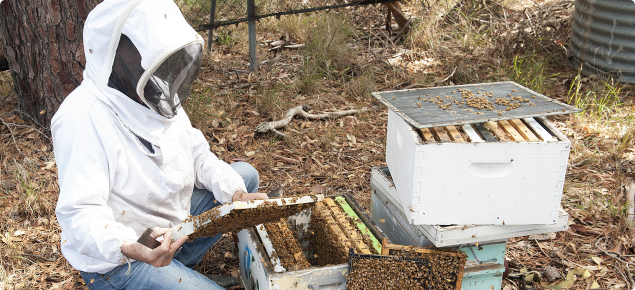There are now two avenues to register as a beekeeper: via the new online Brands Portal or with the existing paper-based applications. The Brands Portal is a secure website that allows Beekeepers, Livestock owners and operators to manage their registrations online. it is the preferred option for submitting registrations. To register as a beekeeper, regardless of whether you have one beehive or 1000, log in to the Brands Portal online.
You will be taken to the Welcome Page which will guide you through the Digital Identity setup and Brands Portal login procedures. If you are unable or prefer not to use the Brands Portal, download the Beekeeper registration application form and send in the completed paper forms via email or post.
Upon registration, beekeepers are issued a certificate and provided a unique hive brand that must be burnt, stamped, carved or scored on each of their beehive boxes (both brood boxes and honey supers). For further information on registration using the Brands Portal or paper forms, visit the Registering as an owner of stock or as a beekeeper webpage or contact the Brands Office (Bunbury) excluding public holidays Monday to Friday 8.30am - 4.30pm AWST. Contact by phone 1300 926 547 or email Brands.Bunbury@dpird.wa.gov.au.
The current costs to register is $76.50 for three years. Additionally, an Agricultural Produce Commission (APC) fee is charged (annually) to assist in bee pest and disease surveillance (i.e. training of beekeepers), particularly for exotic pests such as the Varroa mite.
DPIRD Apiary Officers undertake surveillance and sampling for exotic bee pests and diseases. If you have a bee pest or disease concern, please report this to an Apiary Officer at email PBHoney@dpird.wa.gov.au. If you suspect an exotic pest, such as Varroa mite, immediately call the Exotic Plant Pest Hotline on 1800 084 881.
DPIRD’s Diagnostics and Laboratory Services is available to test for common bee diseases although there is a fee for this work. The most common bee diseases known in Western Australia are American foulbrood (bacteria) and Chalkbrood (fungus). Visit the BeeAware website to learn more about established and exotic honey bee pests and diseases.
Honey bees
The only European honey bee available in Western Australia is Apis mellifera (European honey bee).
Apiaries
An apiary site contains one or more hives. The average commercial apiary site is 100 hives (sometimes fewer when floral resources are limited). These sites can be on a beekeeper’s property, privately negotiated with landholders or on registered apiary sites (under permit) from the Department of Biodiversity, Conservation and Attractions at Beekeeping on Crown land in Western Australia or contact Licensing Officer by email apiary@dbca.wa.gov.au or on 9219 8765.
Total Fire Ban days
On Total Fire Ban days, it is prohibited to use a bee smoker. Refer to emergency.wa.gov.au for Fire Ban alerts.
Buying bees and beekeeping equipment
There are numerous honey bee and equipment suppliers around Perth and WA to suit all styles of beekeeping. Newspapers and websites, such as Gumtree, also advertise equipment and bees for sale. Before making a purchase, check the supplier is compliant with the Australian Honey Bee Industry Biosecurity Code of Practice and that their bees are pest free. Beekeepers may also catch and collect honey bee swarms, but be aware these may carry disease.
Note: Bees and second-hand beekeeping equipment are restricted from entering Western Australia or moving from the Kimberley region.
Please advise a DPIRD Apiary Officer (PBHoney@dpird.wa.gov.au) or the Bee Industry Council of Western Australia (info@bicwa.com.au) if you have any queries or concerns regarding bees or used beekeeping equipment purchases.
Australian Honey Bee Industry Biosecurity Code of Practice
The Australian Honey Bee Industry Biosecurity Code of Practice (the Code) has been developed in consultation with the beekeeping industry and governments to provide a framework for Australian beekeepers to use best-practice biosecurity measures.
Fundamental biosecurity practices outlined in the Code include:
- Training and planning
- Controlling pests and diseases
- Preventing the spread of undetected diseases
- Surveillance for exotic pests and diseases
- Keeping accurate records
- Hive and equipment maintenance
The Code is available in English, Greek, Arabic, Italian and Turkish. Aligned with the Code, all beekeepers in Australia can complete free Biosecurity for Beekeepers online training course.



